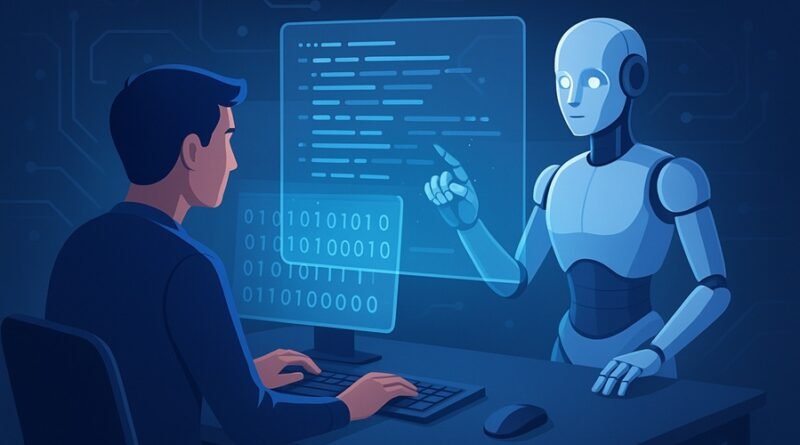AI in Software Development: Transforming the Future of Coding and Innovation
Introduction
Artificial Intelligence (AI) is no longer just a futuristic concept—it has become a powerful enabler across industries, including software development. From automating repetitive coding tasks to enhancing testing efficiency and predicting project risks, AI is reshaping how software is designed, built, deployed, and maintained.
For developers, startups, and enterprises, understanding AI’s role in software development is crucial to staying competitive in today’s rapidly evolving digital economy. Companies like convertedge.ca
How AI is Used in Software Development
1. AI-Powered Code Generation
- Tools like GitHub Copilot and Tabnine use natural language prompts to generate code snippets.
- AI models trained on vast code repositories help developers write functions faster, reducing boilerplate work.
- This accelerates productivity and allows developers to focus on problem-solving rather than syntax.
2. Automated Testing and Debugging
- AI-driven testing tools can automatically detect bugs and suggest fixes.
- Machine learning models analyze previous error patterns to predict potential vulnerabilities.
- This reduces manual testing time and improves software quality.
3. AI in Project Management
- Tools powered by AI help project managers estimate timelines, resource allocation, and risk assessment.
- Predictive analytics highlight potential bottlenecks before they impact delivery.
- Chatbots and virtual assistants streamline communication within teams.
4. Natural Language Processing (NLP) for Documentation
- AI simplifies technical documentation by automatically generating API references, user manuals, and FAQs.
- NLP allows developers to interact with code using plain English queries.
5. AI in Cybersecurity for Development
- AI models detect unusual patterns in software behavior to prevent cyberattacks.
- Automated vulnerability scanning ensures secure coding practices.
- Continuous monitoring protects deployed applications.
6. Low-Code/No-Code Development with AI
- AI enables citizen developers—non-technical users—to create apps using drag-and-drop interfaces.
- Platforms like Mendix and OutSystems integrate AI to simplify software creation.
Benefits of AI in Software Development
- Faster Development Cycles – Automated coding, testing, and debugging reduce time-to-market.
- Improved Accuracy – AI minimizes human errors in coding and documentation.
- Cost Efficiency – Automation reduces development costs by cutting down manual effort.
- Scalability – AI helps in maintaining and scaling complex enterprise systems.
- Enhanced User Experience – AI-driven personalization improves software usability.
Challenges of AI in Software Development
- Bias in Training Data – AI models trained on biased data can produce flawed code.
- Dependence on AI – Over-reliance may reduce developer problem-solving skills.
- Security Risks – AI-generated code might introduce hidden vulnerabilities.
- Ethical Concerns – Ownership of AI-generated code raises intellectual property debates.
- Skill Gaps – Developers must upskill to work effectively with AI-powered tools.
Future of AI in Software Development
- AI-First Development Environments – Integrated Development Environments (IDEs) will natively include AI assistants.
- Self-Healing Code – AI will create code that fixes itself automatically when errors are detected.
- AI-Driven Cloud Development – Cloud platforms will integrate AI for auto-scaling and cost optimization.
- Hyper-Personalized Software – AI will allow software to adapt dynamically to user behavior in real-time.
- Quantum AI in Coding – With quantum computing, AI algorithms may solve coding problems beyond current limits.
Real-World Examples of AI in Software Development
- GitHub Copilot – AI-based code completion tool by GitHub and OpenAI.
- DeepCode (acquired by Snyk) – AI-powered code review and bug detection.
- Kite – An AI assistant for Python developers.
- Testim.io – AI-based automated testing platform.
- Codota – AI code suggestion tool for Java and other languages.
Best Practices for Integrating AI in Development
- Combine AI with Human Oversight – AI should assist, not replace developers.
- Ensure Data Quality – Train AI models on high-quality, unbiased datasets.
- Implement Security Checks – AI-generated code must be validated for vulnerabilities.
- Continuous Learning – Developers should regularly upskill in AI and ML.
- Ethical Use of AI – Define clear ownership and accountability for AI-generated work.
Conclusion
AI in software development is not just a trend—it’s the next revolution. From coding and testing to deployment and maintenance, AI is accelerating innovation while improving accuracy and efficiency. However, challenges around security, ethics, and reliance must be addressed carefully.
As the technology matures, the most successful developers and businesses will be those who adopt AI as a collaborative partner, harnessing its power while retaining human creativity and oversight.
The future belongs to a hybrid model—where AI and human intelligence work hand in hand to build smarter, faster, and more secure software.

